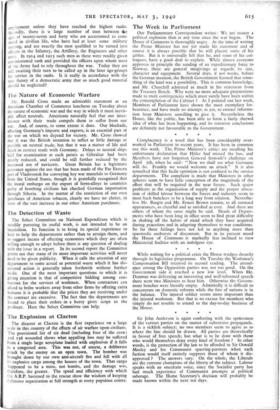Complacency is a word that has been considerably over-. worked
in Parliament in recent years. It has been in common use this week. The Prime Minister's critics are recalling his unfortunate declaration that Hitler had missed the bus, and Members have not forgotten General Ironside's challenge on April sth, when he said : "Now we shall see what Germany will do. Frankly we would welcome an attack." It is also remarked that this facile optimism is not confined to the service departments. The complaint is made that Ministers in other spheres seem to have little conception of the magnitude of the effort that will be required in the near future. Such tnajor problems as the organisation of supply and the proper alloca- tion of skilled labour between the forces and industry seem to most back benchers to be a long way from solution. Neverthe- less Mr. Burgin and Mr. Ernest Brown remain, to all outward appearances, as cheerful and as satisfied as ever. And there are others of whom the same might be said. Heads of Depart- ments who have been long in office seem to find great difficulty in shaking off the habits of mind which they have acquired during peacetime and in adapting themselves to war conditions. So far these failings have not led to anything more than spasmodic outbursts of discontent. But in its present mood the House of Commons is markedly less inclined to view Ministerial frailties with an indulgent eye.


































 Previous page
Previous page